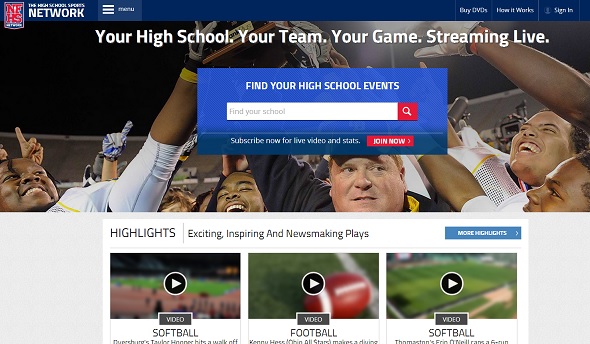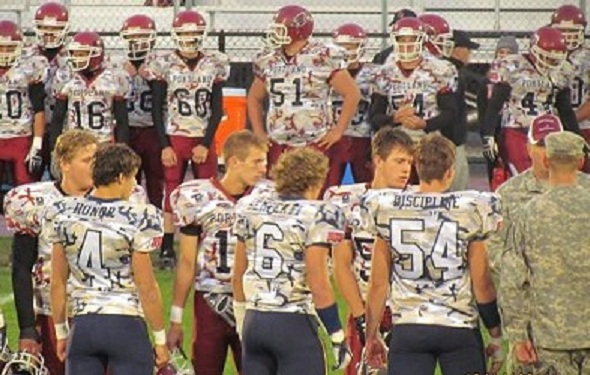
NFHS Network Rooted in Our Back Yards
August 28, 2014
By Jack Roberts
MHSAA Executive Director
Throughout my nearly 28-year tenure with the MHSAA, I have been a consistent and outspoken critic of our national organization, the National Federation of State High School Associations (NFHS), whenever it attempted an initiative that I saw purposed more for its own promotion than as a needed service for its member associations and their member schools.
When its strategy for service was to promote a “national presence” for the NFHS, I objected. I have never felt that national tournaments or national telecasts would be of the slightest benefit to 99 percent of the MHSAA’s member schools; and worse, I have always believed that those initiatives would tend to corrupt the one percent involved.
So it may have come as a surprise to some of my colleagues in this state and my counterparts across the country when I became an early advocate of the NFHS Network and now serve as the network’s first president.
The definitive difference between the NFHS Network and earlier talk of national tournaments and telecasts is that the network’s thrust is local, not national. In fact, it’s hyper-local.
The heart of the NFHS Network consists of the season-ending tournaments of statewide high school associations across the U.S. The NFHS Network produced Internet broadcasts of at least the culminating contests for most of the sports sponsored by most of the three dozen state associations contributing content during 2013-14, the network’s first year of operation.
While state high school associations provide an immense potential for content, there are only 51 member associations of the NFHS, in contrast to the coast-to-coast pool of nearly 20,000 member high schools these associations serve. It is this local content through the School Broadcasting Program that gives the network its legs. The aggregation of all this content is the magnet to draw media partners, sponsors and subscribers; and it is this local emphasis that attracted my support of the concept, and now my service to the network board of directors.
School sports is first, last and always about local teams. And it’s not just high-profile sports and varsity teams; it’s just as much about lower profile programs and subvarsity events.
There are more school-sponsored football games in Michigan during one week than there are NFL games across the U.S. all season long. There are more school-sponsored basketball games in Michigan during one week than there are NBA games across the U.S. all season. And we serve two dozen other sports as well.
Together, the MHSAA and the SBP can provide enough live and on-demand Internet programming to provide MHSAA.tv with authentic high school sports broadcasts 24 hours a day, seven days a week, 365 days each year. And those who subscribe to Internet broadcasts on MHSAA.tv have access to content from the local school and state association level from coast to coast and border to border.
The success of the NFHS Network will not be “made-for-TV” national-scope tournaments or matchups between teams with the most highly recruited players. Our success will come from the aggregation of thousands of typical local rivalries that are played all school year long in every nook of this state and every cranny of our nation.
At least while I’m involved, the NFHS Network will be true to the mission of school-based sports and uplift the values for which educational athletics have always stood.
For years, school sports have stood apart from non-school sports as the preferred brand of youth sports because we offered letter jackets, pep assemblies, pep bands, marching bands, cheerleaders and homecomings. Going forward, school sports will also stand apart from other youth sports because of the NFHS Network.

Wounded Warrior Project: DeWitt vs Portland
December 16, 2011
DEWITT -- The meeting of two state-ranked teams always will ratchet up a typical football night. Both communities, naturally, want to see which is better on the field.
But during the hour before the opening kickoff Oct. 14 of DeWitt’s game against Portland, those teams and their supporters together recognized a grander cause. The night was dedicated to the Wounded Warrior Project, which aids U.S. soldiers (and their families) who have suffered service-related injuries and illnesses.
Rain washed out some planned attractions, but the evening certainly was memorable. Both teams wore camouflage jerseys and each sent its captains to the pre-game coin toss with an honorary captain representing the military. A number of other service personnel were involved – including a local color guard that presented a 30-foot flag for the national anthem.
It’s understandable if people’s visions of wars and our military are focused an ocean away. But connections hit close to home. DeWitt’s honorary captain, Lansing’s U.S. Army Spc. Jacob Shumway, recently returned from a deployment and has been in the service for two and a half years. He’s a 2003 Lansing Everett graduate, and his mother Susan Land is the principal at Lansing Eastern. His cousins Ethan and Collin Rennaker start for DeWitt, and he walked alongside them for the pregame flip. Shumway plans to attend Lansing Community College and study digital graphic design.
Both teams are considered contenders for their respective state titles next month; DeWitt is ranked No. 7 in Division 3, while Portland is No. 4 in Division 5. And they played like it – Portland prevailed 22-20 in overtime.
A great game, no question. But similarly significant was a preliminary figure of more than $11,000 raised for the WWP.
For more about the Wounded Warrior Project visit http://www.woundedwarriorproject.org.

